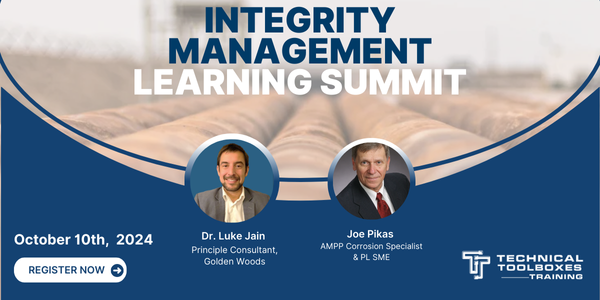Identifying Vintage and Modern Pipe Types (previously recorded live training)
-
Author: Technical
Toolboxes -
Level: Advanced
-
Study time: 2 hours
Write your awesome label here.
Course overview
**This is a previously recorded virtual training, now provided in on-demand format with PDHs available.**
There is increased interest among pipeline operators in using randomly selected samples of pipe to determine the characteristics of an entire pipeline segment. An important consideration is determining whether all the pipe samples represent the same population of pipe or whether the observations indicate that multiple populations of pipe are present. When multiple pipe populations are present the mechanical properties and metallurgical characteristics can be different for each population. As a result, the vulnerabilities and threats to long-term integrity can be different, and sampling plans may need to be modified to obtain a statistically defensible number of measurements for each population.Webinar participants will learn how to use visual and nondestructive inspection to identify: the manufacturing process used to make the pipe, the manufacturer of the pipe, whether the pipe was rehabilitated after prior service and reused in a new application, and the related integrity and much more.
There is increased interest among pipeline operators in using randomly selected samples of pipe to determine the characteristics of an entire pipeline segment. An important consideration is determining whether all the pipe samples represent the same population of pipe or whether the observations indicate that multiple populations of pipe are present. When multiple pipe populations are present the mechanical properties and metallurgical characteristics can be different for each population. As a result, the vulnerabilities and threats to long-term integrity can be different, and sampling plans may need to be modified to obtain a statistically defensible number of measurements for each population.Webinar participants will learn how to use visual and nondestructive inspection to identify: the manufacturing process used to make the pipe, the manufacturer of the pipe, whether the pipe was rehabilitated after prior service and reused in a new application, and the related integrity and much more.
-
Video time: 2.5 hours
-
Exams: 1
Bill Amend
Technical Advisor at RSI Pipeline Solutions (semi-retired): Pipeline Integrity, Metallurgical Engineering and Training
ABOUT Bill
Mr. Amend has provided metallurgical engineering services to the energy industry (oil & gas production and pipelines and geothermal energy production) since 1979. He previously worked with DNV (12 years), Structural Integrity Associates (5 years), Southern California Gas Company (14 years), and Unocal Corporation (12 years).
His areas of expertise include failure analysis, integrity management of early vintage steel pipelines and pipeline welds, in-situ, nondestructive determination of pipe properties, development and review of welding procedures for in-service pipelines and pipeline repair, materials selection for hydrogen pipelines, materials testing and selection for severe geothermal environments, and technical training.
He has served in various leadership roles in subcommittees of API 1104 and has managed and conducted several research projects for PRCI, earning the Distinguished Service Award from PRCI in 2002. He is a co-holder of three U.S. patents related to the control of corrosion in geothermal systems.
Mr. Amend is a Professional Engineer registered in the State of California. He earned a Bachelor of Science in Metallurgical Engineering from Cal Poly, San Luis Obispo.
His areas of expertise include failure analysis, integrity management of early vintage steel pipelines and pipeline welds, in-situ, nondestructive determination of pipe properties, development and review of welding procedures for in-service pipelines and pipeline repair, materials selection for hydrogen pipelines, materials testing and selection for severe geothermal environments, and technical training.
He has served in various leadership roles in subcommittees of API 1104 and has managed and conducted several research projects for PRCI, earning the Distinguished Service Award from PRCI in 2002. He is a co-holder of three U.S. patents related to the control of corrosion in geothermal systems.
Mr. Amend is a Professional Engineer registered in the State of California. He earned a Bachelor of Science in Metallurgical Engineering from Cal Poly, San Luis Obispo.

